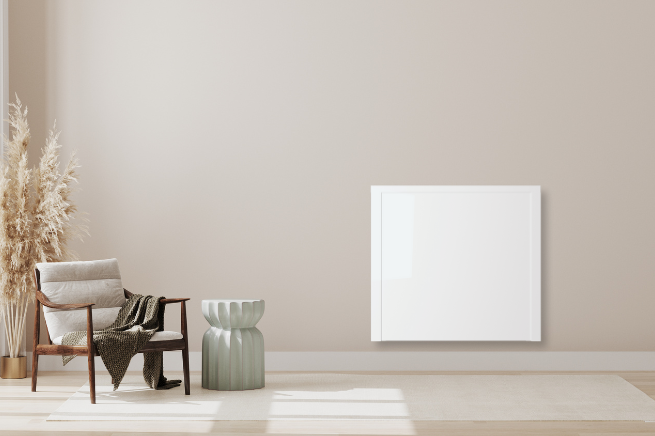
With energy prices rising and sustainability becoming a priority, many homeowners and businesses are searching for the most efficient heating solutions. Infrared heating has gained attention for its energy efficiency and rapid warmth, but is it truly the best option? In this guide, we’ll explore how infrared heaters work, their pros and cons, and how they compare to other electric heating options like the NEOS electric radiator.
Before we dive into the pros and cons of infrared heating, it’s essential to understand what it is and how it works. Unlike traditional heating systems that warm the air in a room, infrared heaters emit (safe) electromagnetic waves that directly heat objects and people in their path. This process is similar to how the sun warms the Earth – the infrared radiation travels through the air until it hits a solid surface, which then absorbs the energy and heats up.
Infrared heating can be broadly categorized into three types based on the wavelength of the radiation emitted:
Near-infrared (NIR)
Medium-infrared (MIR)
Far-infrared (FIR) This is used the most for residential and commercial heating purposes, as they provide a gentle, consistent warmth without the intense light associated with near-infrared heaters.
Infrared heating offers several advantages, making it a popular choice for homes and businesses. Here’s why:
Instant, direct warmth
Heats people and objects immediately
Great for occasional use or for spaces that need quick heating
Energy Efficient & Cost-Effective
Minimal Heat Loss through the air
Possibility of using less electricity to reach a desired temperature as they heat up more quickly
Silent Operation
No fans, motors, or moving parts so completely silent while running
Ideal for bedrooms, offices, or any spaces where noise would be disruptive
Health Benefits - No Air Circulation
Can be ideal for people with allergies or respiratory issues since they don’t rely on circulating air
Flexible Installation Options
Available wall-mounted, ceiling-mounted, and portable models
Sleek and space saving to suit all kinds of interiors
While infrared heating has its merits, it’s crucial to understand how it compares to other electric heating options, particularly when it comes to effectiveness and overall room comfort. Let’s explore this comparison in depth:

Convection heaters, such as the NEOS electric radiator, work by heating the air in a room. As the air warms, it rises, creating a natural circulation that distributes heat throughout the space. This method can be more effective at providing consistent, all-over warmth in a room, especially in well-insulated spaces.
While infrared heaters offer instant, directional warmth, they may not heat a room as evenly as convection heaters. Objects and people in the direct path of the infrared rays will feel warm quickly, but areas out of the direct line of sight may remain cooler. This can create “cold spots” in a room, which might be less comfortable for some users.
Convection heaters like the NEOS electric radiator excel in distributing heat evenly throughout a room. They work by creating a natural air circulation pattern, which helps to maintain a consistent temperature from floor to ceiling. This can result in a more comfortable environment, especially in larger spaces or rooms with complex layouts.
Infrared heaters, on the other hand, provide more localised heating. While this can be advantageous in certain situations (such as heating a specific work area in a large warehouse), it may not be ideal for creating an evenly heated living or working space.
Once a room is heated to the desired temperature, convection heaters can maintain that warmth efficiently. The heated air acts as a buffer, helping to keep the room warm even when the heater cycles off.
Infrared heaters, while providing instant warmth, may need to work continuously to maintain comfort levels, especially in larger spaces. This is because they don’t heat the air, so the warmth dissipates quickly when the heater is turned off.

If you’re a homeowner or business owner considering infrared heating, there are several factors you should take into account:
Room Size and Layout - Infrared heaters work best in smaller, enclosed spaces. For large rooms and open-plan spaces, it may not be ideal
Insulation Quality - Infrared heating can be effective in poorly insulated spaces but optimal insulation is always key when it comes to your heating working efficiently
Heating Patterns - If quick targeted heating for short periods of time is your goal, infrared heaters may work but consistent all-day warmth, a convection system like the NEOS would be more suitable
Safety Considerations - While infrared heaters are considered safe, they can become very hot on the surface, causing potential concern with young children or pets.
Energy Costs and Efficiency - A cost-benefit analysis is essential, despite infrared heating being considered energy-efficient. Factors such as the size of the space, current energy costs and hours of operation need to be acknowledged.

Infrared heating offers a unique approach to warming spaces, with benefits such as instant heat, energy efficiency in certain scenarios, and silent operation. However, it’s not a one-size-fits-all solution. For many homeowners and businesses, a combination of heating technologies, like our NEOS electric radiator, might provide better overall comfort and efficiency.
Ready to explore an alternative to infrared heating? Download our FREE heating guide today!
Tags: Comparisons, Tips, General Guides.

If you are considering electric heating/electric radiators, then this guide tells you everything you need to know. Discover this modern, sustainable and economical method of heating that gives you complete control and comfort. Download Free Guide now.

*Trust Electric Heating needs the contact information you provide to us to contact you about our products and services. You may unsubscribe from these communications at any time. For information on how to unsubscribe, as well as our privacy practices and commitment to protecting your privacy, check out our Privacy Policy.
Quick installation and a 100 day warmth guarantee. Whether you’re buying one or several radiators, if our radiators don’t heat your room to a minimum of 20 degrees we will undertake to upgrade or replace the radiators free of charge.
Book your free consultation